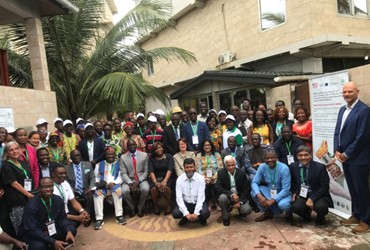On October 31, 2024, Liberia’s Ministry of Agriculture launched the Seeds4Liberia Project, an initiative aimed at enhancing seed quality and accessibility for farmers across the country. Officially named “Building Resilient Seed Systems for Rice, Cassava, Soybean, Coffee, and Fish Value Chains to Strengthen Food and Economic Diversification in Liberia,” the project represents a pivotal step in transforming the nation’s agricultural landscape. During the launch, Deputy Minister for Administration Antoinette Dukuly articulated the project’s significance, highlighting that high-quality seeds are essential for sustainable agricultural production. The initiative specifically targets prevalent issues like the use of uncertified seeds, heavy import reliance, and inadequate infrastructure for local seed production.
The Seeds4Liberia Project is strategically aligned with Liberia’s National Agricultural Development Plan (NADP) for 2024-2030, which emphasizes food self-sufficiency, rural transformation, and economic growth. By focusing on improving seed quality and accessibility, the project aims to empower farmers, enabling them to increase their productivity and enhance their livelihoods. Minister Dukuly noted that the project’s success would have far-reaching impacts on food security, job creation, and economic diversification nationwide. The goal is not merely to improve agricultural output but to foster a more resilient economy that can withstand challenges and harness potential growth opportunities.
Over its four-year duration, the Seeds4Liberia Project will implement several specific initiatives, including the production of 6,000 tons of certified rice seeds aimed at reducing imports by 70% within five years. Additionally, efforts will be made to increase seed production in cassava, soybean, and coffee, contributing to a more diverse agricultural base. The project will also facilitate access to mechanization and finance, as well as forge research partnerships, in an effort to bolster the country’s overall agricultural capacity. Emphasizing the need for local production, EU Ambassador to Liberia, Madam Nona Deprez, highlighted the European Union’s commitment to helping Liberia build its own seed systems to reduce dependency on foreign imports and promote sustainability in domestic food production.
A key feature of the Seeds4Liberia Project is its collaborative approach, leveraging the expertise of various organizations, including AfricaRice, the International Institute of Tropical Agriculture (IITA), and WorldFish. These entities will work alongside local partners such as the National Fisheries & Aquaculture Authority (NaFAA), Liberia Agricultural Commodity Regulatory Authority (LACRA), and the Central Agriculture Research Institute (CARI) to implement the project effectively. This partnership reflects a shared responsibility to develop seeds tailored to Liberia’s specific climate conditions, ultimately aiming to improve productivity and build a resilient agricultural sector that benefits local communities and contributes to enhanced food security.
The comprehensive framework provided by the Seeds4Liberia Project seeks not only to mitigate the challenges of seed quality and accessibility but also to set a precedent for a sustainable agricultural future in Liberia. By directly addressing the systemic issues that have plagued the agricultural sector, such as dependency on imported seeds and inadequate infrastructure, the government and its partners aim to empower farmers and promote local seed production. This approach could transform the agricultural landscape, making it resilient and capable of sustainably meeting the needs of the population while fostering economic diversification through increased agricultural productivity.
Ultimately, the Seeds4Liberia Project is positioned as a cornerstone of Liberia’s strategy for agricultural development, aligning with broader economic goals and the urgent need for food security. As stakeholders work together to implement the various components of the project, the expectation is that it will yield long-lasting benefits for farmers, facilitate the growth of rural communities, and contribute to the nation’s overall economic stability. Through enhanced seed systems and a commitment to quality and accessibility, Liberia is taking significant strides toward achieving agricultural self-sufficiency and resilience, setting the stage for a prosperous future.


